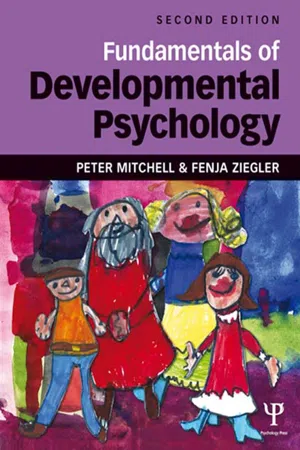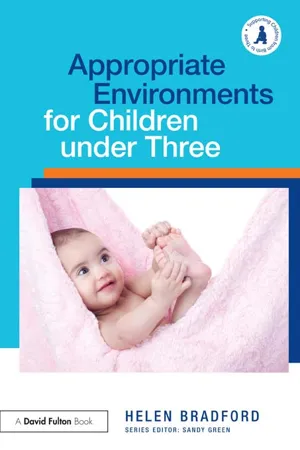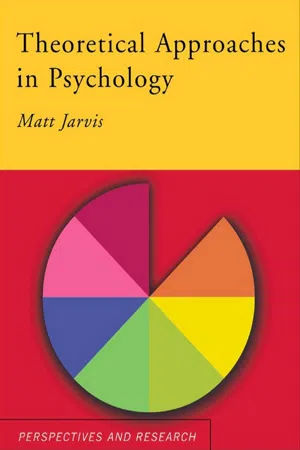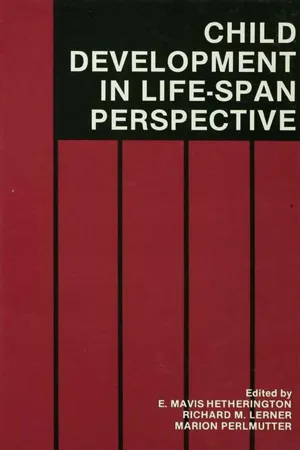Psychology
Cognitive Development in Childhood
Cognitive development in childhood refers to the growth and maturation of a child's mental processes, including perception, memory, problem-solving, and language acquisition. This development is influenced by both biological and environmental factors, and it occurs in distinct stages, as proposed by theorists like Jean Piaget. Understanding cognitive development in childhood is crucial for educators, parents, and psychologists in supporting children's learning and overall well-being.
Written by Perlego with AI-assistance
Related key terms
6 Key excerpts on "Cognitive Development in Childhood"
- eBook - ePub
Forensic Psychiatry
Fundamentals and Clinical Practice
- Basant Puri, Ian H. Treasaden(Authors)
- 2017(Publication Date)
- CRC Press(Publisher)
8Developmental psychology
NATHALIA L. GJERSOE AND CATRIONA HAVARD Introduction Cognitive development Personality Social development Sexual development The child as witness Conclusion ReferencesINTRODUCTION
Developmental psychology is a discipline that encapsulates the full spectrum of psychological processes throughout the life span. Theories developed as part of this research have important implications not just for our understanding of children’s behavior and growth but also for how we conceptualize the human mind as a whole. Often there are processes so inextricably interwoven and sophisticated in adults that understanding them requires examination from their inception in the developing brain. This chapter focuses on the age range between infancy and late childhood and summarizes theories of children’s cognitive, personality, social, and sexual development, concluding with an outline of current opinion regarding children’s capacities as eyewitnesses.COGNITIVE DEVELOPMENT
Even newborns come into the world with a toolkit of basic sensory capacities and biases to attend to specific types of information. This stream of information forms the basis for mental representations—patterns of neuronal activity that refer to aspects of the external world. Developmental cognitive psychology examines mechanisms of change in mental representations throughout the life span. Examining cognitive development in infants and young children requires its own set of methodologies distinct from those used to examine adults. Children have limited communication and -comprehension abilities, disorganized or slow motor responses, and are easily distracted. Traditionally, research into cognitive development utilized naturalistic observation of children’s behavior at different ages and manipulated situations to determine if children’s responses changed in a reliable manner from age to age. This work has revealed a host of cognitive capabilities that all typically developing children seem to attain within a very similar time period—referred to as cognitive milestones - eBook - ePub
- Peter Mitchell, Fenja Ziegler(Authors)
- 2013(Publication Date)
- Psychology Press(Publisher)
3 DOI: 10.4324/9780203736357-3Contents
Introduction Stages of cognitive development Piaget’s explanation of cognitive development Traditional learning theory as a contrasting explanation of development A supplement to Piaget’s theory: Self-centered adolescents SummaryThe development of thinking 3
Chapter Aims- To introduce Piaget’s theory of cognitive development. To detail Piaget’s stages.
- To detail the evidence that lends support to Piaget’s stage theory.
- To present the mechanism that Piaget posited as responsible for cognitive development.
Introduction
The discipline concerned with studying the development of thinking is cognitive developmental psychology. The word “cognitive” refers to knowledge, but not necessarily according to the common meaning of the word. When people talk about knowledge, they usually mean the kind of information useful for answering questions in games such as The Weakest Link or Who Wants to be a Millionaire, or in order to do college exams. In contrast, cognitive developmentalists think of knowledge as referring to understanding about things.You might have noticed a child aged around 5 years speaking on the telephone about things only he can see: He seems to overlook the fact that the person he is speaking to is in a completely different location and cannot see the same things. Perhaps this is a sign that the young child is incapable of putting himself in someone else’s shoes. In the broadest sense, it is tempting to suppose that the child does not understand that other people can have different perspectives. Cognitive developmentalists look at particular difficulties children have, such as poor communication ability, and then draw general conclusions about their underdeveloped knowledge of the world. An exciting aspect of cognitive developmental psychology concerns the things children say and do in various situations, and then speculating about the meaning of these in terms of what the child does or does not know about the world. - Helen Bradford(Author)
- 2013(Publication Date)
- Routledge(Publisher)
Chapter 1 that a purpose of early years care and education is to enable each child to achieve higher levels of development through interaction with their physical and social environments. To put this another way, appropriate environments play a pivotal role in supporting and extending the development and learning of babies and children under three. It is therefore essential to start from where each child is, developmentally, in order to provide age-appropriate care and support. This is an age group with unique characteristics, which behaves in certain ways, and which has specialised needs. The principal need for new-born babies is that of calm, for example. The successful early years practitioner must recognise the essential nature of babies and children under three and design learning environments that facilitate the achievement of their developmental goals. Consistency for this age group is vital and hugely important on two counts. First, babies and children under three need a stable, reliable group of caregivers with whom they can form secure relationships. Second, they need consistency in relation to their physical environment; an ‘identifiable space whose parameters are regular, dependable and comfortable’ (Dimond, 1979: 27). At the same time, they will need opportunities to respond to challenge within the environment. From their early days of playing simple games such as peek-a-boo and hide-and-seek, children will progress to needing real adventure. To be able to venture into the uncharted unknown however, they need the reassurance of the known. An appropriate environment will recognise and provide for these two juxtaposed needs in the developing child.Contexts for development
1. Cognitive development
The outcome of cognitive development is thinking. However, a young child's ability to think is a process that develops over a prolonged period of time. This is because of the gradual and orderly changes that must occur to ensure their thinking processes become more complex and sophisticated. Piaget, Bruner and Vygotsky all developed cognitive development theories, each emphasising different areas and ideas in relation to a child's development. In addition, both Piaget and Vygotsky were regarded as constructivists. A constructivist approach is one that regards the individual as an active learner who constructs and internalises new concepts, ideas and knowledge based on their own present and past knowledge and experiences. In other words, the learner develops their own hypotheses and builds new knowledge based on what they already know. Following this line of thinking, learning is not fixed and inert, but continually developing. It is clear that theories of cognitive development have profound implications in terms of how the early years practitioner responds to young children. All contemporary theories are agreed that the environment, both physical and social, plays an important role in nurturing children's learning (Ford, 2009). Children's cognitive growth can therefore be enhanced by enriching their early experiences; for example by increasing their access to books and toys, their opportunities for play and their exposure to interaction with more capable others.- eBook - ePub
- Matt Jarvis(Author)
- 2005(Publication Date)
- Routledge(Publisher)
- Cognitive-developmental theory has been applied successfully in the field of education. Modern teaching techniques ranging from individual discovery learning to computer-aided work in pairs has been influenced by the work of Piaget and Vygotsky.
- There are other situations in which it is helpful to have a good understanding of the way in which children think. These range from play-work, in which it is helpful to understand children’s concepts of rules, to anaesthesiology (the study of pain and pain relief), where it is invaluable to have a grasp of children’s understanding of the pain they are experiencing as a result of medical conditions and medical procedures.
Despite these invaluable contributions, a cognitive-developmental approach is not generally considered to be sufficient for a complete understanding of psychology, or even of child psychology. Some of its limitations include the following:- From a psychodynamic perspective, the cognitivedevelopmental approach neglects the importance of children’s emotional development. In a sense this is not a fair criticism of Piaget, who admired the work of Freud (see Chapter 3 ) and saw his own work as complementing rather than rivalling Freud’s theories. However, it is fair to say that the cognitivedevelopmental approach does not really tackle emotional development, which is clearly of huge importance to children’s psychological development.
- From a behavioural perspective (see Chapter 2 ), the cognitivedevelopmental approach overemphasises speculation about mental processes at the expense of more scientific research into the importance of conditioning in learning.
Summary
Cognitive-developmental psychology is an approach to understanding the development of logical thought, and the ways in which this impacts on our behaviour. The most influential theory in this area comes from Piaget, whose major contribution was in identifying the ways in which childhood logic differs from that of adults. Piaget also emphasised the process by which children explore and learn from their environment. Vygotsky broadly agreed with many of Piaget’s ideas, but placed more emphasis on the importance of learning from others than learning by discovery. Both Piaget’s and Vygotsky’s ideas have been applied to teaching. The ideas of both Piaget and Vygotsky point towards an active role for pupils in their learning, but whereas followers of Piaget advocate solo discovery learning, educationalists influenced more by Vygotsky tend to prefer group work and more help by teachers and other learners. Computer-aided learning, a growth area in education, can be understood from the viewpoints of both Piaget and Vygotsky. - eBook - ePub
- Patricia Heindel(Author)
- 2016(Publication Date)
- Research & Education Association(Publisher)
CHAPTER 6 Cognitive Development Throughout the Life Span Chapter 6 Cognitive Development Throughout the Life SpanELEMENTS OF COGNITIVE DEVELOPMENTThinking is defined as the manipulation of mental representations. Cognition includes the mental activities involved in the acquisition, storage, retrieval, and use of knowledge. The most rapid cognitive development takes place during the first few years of life when the brain is growing rapidly. As the following discussion shows, however, cognitive development is best described as a life-long process.ConceptsA basic element of thought is the concept. A concept is a label that represents a class or group of objects, people, or events that share common characteristics or qualities. We organize our thinking by using concepts, and concepts allow us to think about something new by relating it to a concept we already know.Some concepts are well-defined, and each member of the concept has all of the defining properties; no nonmember does. An example would be registered voters—you either are or are not registered to vote. Other concepts are not so clearly defined but are encountered frequently in our everyday life. These natural concepts have no set of defining features but instead have characteristic features—members of this concept must have at least some of these characteristics. “Bird” is a natural concept. Birds range from chickens to sparrows to ostriches. Prototypes are objects or events that best represent a natural concept. A sparrow or robin would be considered a prototypical bird by many individuals. New concepts are easier to learn if they are organized around a prototype.ReasoningReasoning involves processing information to reach a conclusion. It includes evaluating and generating arguments to reach a conclusion. Inductive reasoning involves reasoning from the specific to the general. For example, drawing conclusions about all members of a category or concept based on only some of the members is inductive reasoning. Deductive reasoning is reasoning from the general to the specific. Making a prediction based on a theory involves deductive reasoning. Logical reasoning involves using mental procedures that yield valid conclusions. - eBook - ePub
- E. Mavis Hetherington, Richard M. Lerner, Marion Perlmutter(Authors)
- 2013(Publication Date)
- Psychology Press(Publisher)
9 COGNITIVE DEVELOPMENT IN LIFE-SPAN PERSPECTIVE: From Description of Differences to Explanation of Changes Marion Perlmutter University of Michigan ABSTRACT The purposes of this chapter are to articulate an agenda for cognitive developmentalists and to consider how well it is being met. It is suggested that cognitive developmentalists should be addressing two major questions: What are the ways that cognition changes with age? and What are the causes of this change? An overview of alternative approaches to the study of cognitive development is presented, and an integrative, three tier model, framed within a multidisciplinary perspective is forwarded. It is argued that research on cognitive development has made considerable progress with respect to describing the ways that cognition changes with age but has failed in explaining the causes of age change. Some conceptual reasons for the paucity of such information are discussed, and recommendations are made for the reconceptualization of research design, adoption of a life span perspective, and reassessment of assumptions. INTRODUCTION Cognition is a psychological construct that refers to all of mental life. It includes perception, memory, intelligence, reasoning, judgment, and decision making. It permits humans to represent and to think about the world, to conceptualize experience, to fantasize beyond experience, to maintain a sense of self, and to communicate with others. It expands individual competence and allows us to solve and to circumvent problems. Memory, for example, keeps track of events that have occurred in different times and distant places. Intellectual skills enable us to reflect upon experiences and to attach meaning and significance to them. As individuals, this ability gives us the power to anticipate and plan for the future, to develop strategies, to hypothesize alternatives, and to evaluate consequences
Learn about this page
Index pages curate the most relevant extracts from our library of academic textbooks. They’ve been created using an in-house natural language model (NLM), each adding context and meaning to key research topics.





